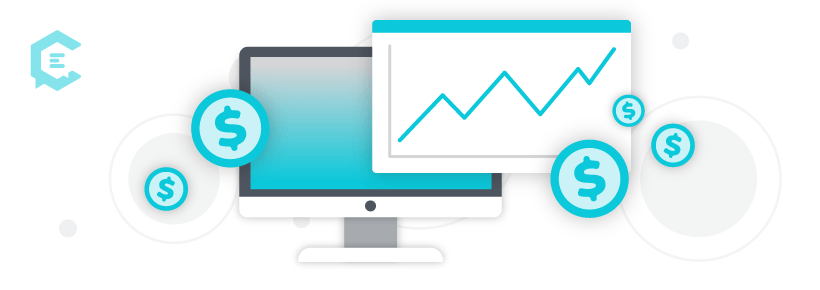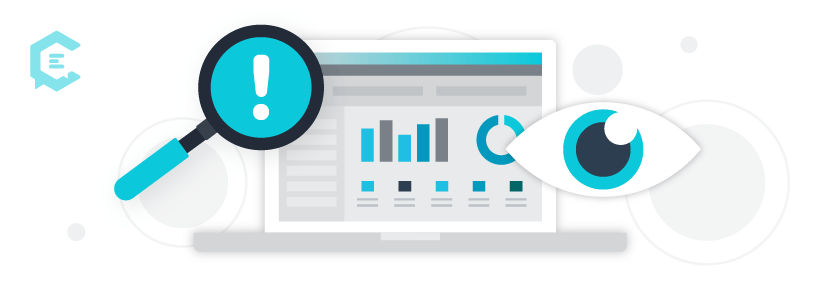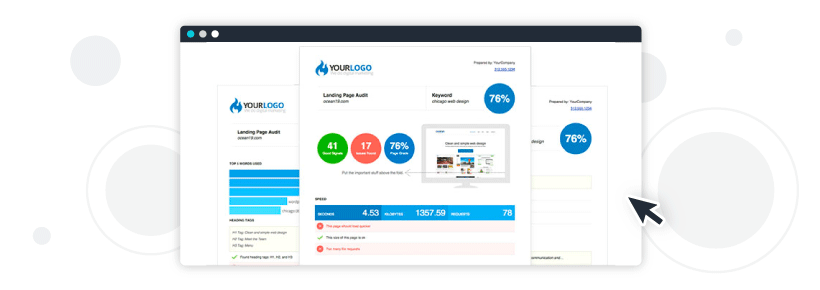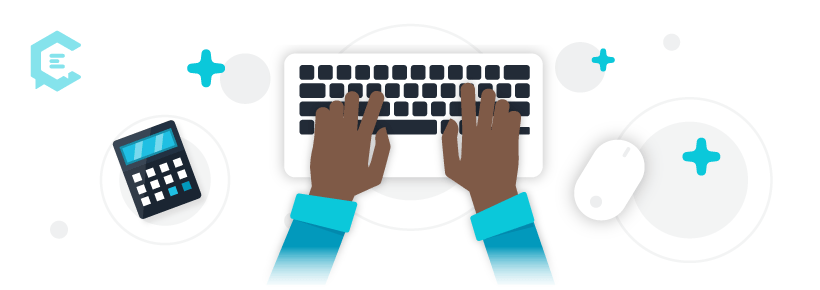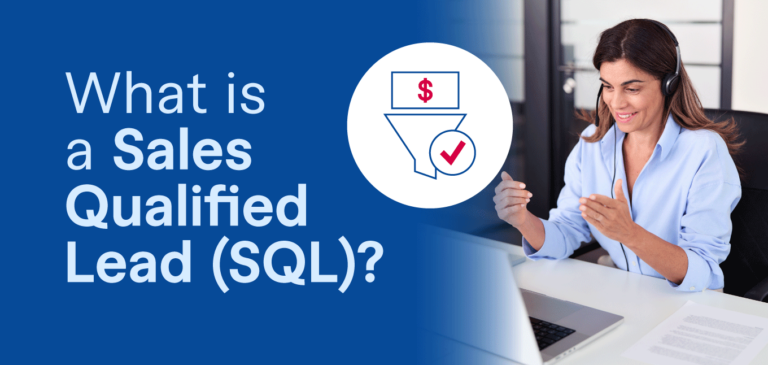To white-label marketing tools that make your agency look bigger and more professional than the competition, look for marketing solutions that allow you to fully brand the tool as your own, from visual appearance down to domain; to manage billing and support; to keep your team and client collaboration branded; and to send emails from your own domain.
I’ve worked with dozens of brands, and many of them wouldn’t have felt as comfortable working with me if they had known how small of a shop I was running — just myself and a few other contractors. For example, while working with one of the largest office supply stores in the USA, I managed a $6 million annual paid search budget for a new product line they were launching. They had a team of six people on their side dedicated to this new product. On my side, there were only two of us. And yet, we gained their confidence through hard work and a fair amount of looking bigger than we actually were.
The biggest component of looking bigger than you actually are is by doing a better job than the larger agencies could do. Part of this is hard work and smarts, but a large component comes down to the marketing technology you’re leveraging.
In fact, recently when I was speaking at the Information Development World conference on the topic of chatbot content development, several individuals from large companies (names like IBM, Microsoft, and Amazon) came up to me after the presentation and voiced concerns that their large organizations struggle because they aren’t leveraging the right marketing technologies. When stacked up against large companies, your small agency can truly shine, showing that you are more nimble and flexible in your offerings. If you’ve got a few white label marketing products, or a content creation partner such as ClearVoice’s Partner Program, you will be able to win more business from boosting the apparent size of your company while offering more services to your end client.
There are so many great marketing tools out there that have white label functionality. Marketing agencies of all sizes can use these to make themselves more professional, responsive, and accurate in their work.
What does “white label” mean?
At the risk of being presumptuous, it’s important to clarify what a “white label” marketing solution is.
The term “white label” has its origin at a time when physical products, such as vinyl records, were sent in white packaging that allowed for the retailers to put on their own trade dress and sell as their own. Despite their comeback, I’m guessing that you’re not selling vinyl records. In our current usage, a white label product has come to mean one that is produced with the intention of being relabeled by the customer-facing party (the retailer).
For marketing professionals and agencies, a white label solution is one that was created by a third party and then licensed by you for your own brand’s use. You put your brand on the marketing solution and claim it as your own. It helps you better manage the numerous elements of marketing so that you can do better work, and look good at the same time. In short, white label marketing tools are a great way to scale your business without hiring a lot of extra personnel or committing additional revenue toward marketing products.
But white labeling for marketers is not only limited to marketing tools; there are also firms, such as ClearVoice with its partner program, that offer white label content creation for agencies trying to scale their businesses. With white label content creation, the teamlancing talent provider is poised to help agencies expand their content offerings with white glove, fully managed content creation.
Avoid the “build it yourself” trap
Extra budget that isn’t already dedicated to a product doesn’t come often, but I have had several clients who have just come into money (usually due to a new investment round) that decided they would like to put that money toward building their own marketing tools.
I’ve also worked with a few successful agencies who have wanted to branch out and create their own marketing tools in order to diversify their revenue streams. While I think diversifying revenue streams is important to the long-term viability of a business, one must take this approach carefully, balancing the buy or build decision with a careful evaluation of the pros and cons of such.
Pros and cons of building your own martech tools
Here are several positive benefits of building your own tools:
- You own the code which means you can also sell it to other agencies or firms for a diversified income stream.
- You can more precisely and delicately integrate it with other tools in your martech stack.
- If it lacks a feature you really need, you can prioritize that for the next build iteration.
Here are a few negatives of building your own tools:
- You may lose focus on your current business because you have to worry about its development, cost, and maintenance.
- Other agencies or martech providers may have already created it, and so spending your time on it would be a waste of effort.
- You’ll likely find yourself diverting resources to develop the missing feature, instead of focusing on your key value-adding business.
Pros and cons of buying an already existing white label tool
Here are several advantages of buying an already existing tool:
- The implementation of the tool is generally faster. Unlike building software which sometimes takes a few months or even years, getting a pre-built solution up and running should be possible in days or weeks.
- The upfront cost is lower than building the tool.
- Business owners can focus on a more important part of the business since providers tend to handle the training, maintenance, and hosting of their software.
Here are some negatives of buying an existing white label marketing agency solution:
- You are more reliant on the solution vendor; If the tool is lacking a feature that you need you’ve got to ask for it and hope it makes it into their list of priorities.
- You may decrease your competitive advantage you hold over competitors if you buy vs. build, as your competitors are likely using the same pre-built tools you are.
For most of my clients, I recommend that they use white label marketing software. There is no need to reinvent the wheel. Anna-Liisa Goggs shared this fantastic insight on Entrepreneur Magazine, “If your business needs to manage operational processes online, such as e-commerce transactions, customer or community management, membership schemes or others, check first if there are white label platforms out there already providing what you need. Don’t reinvent the wheel, and partner with the best-in-class providers that can help scale your business faster.”
Markup potential with white labeling marketing solutions
One key characteristic of white label solutions is that if you have just one or two clients that are using the solution, you’ll already be “in the money.” This is due to the fact that these solutions are affordable, and you can mark up the service or solution to a rate that you and your client both think is fair.
For example, let’s say you have a client who needs an email-sending platform. Instead of sending them to a solution like MailChimp, where they’ll pay $75/month for 5,000 subscribers, you can set them up with a Sendy installation on an Amazon server. Sendy is a one-time cost of $59, and then an ongoing Amazon email server subscription for the 5,000 subscribers would be only $1 a month. If you agree to manage their email server (easy), then you could charge $50/month, saving your client $25/month and helping cover your bottom line with a $48/month income.
Setting up a white label email solution, like Sendy, on an Amazon server may sound like you’ll need a degree in computer science. However, after five relatively simple steps and about an hour dedicated to following the Sendy installation guide, your software will be up and running.
5 things to look for in a white label marketing solution
Depending on what kind of white label marketing solution you are thinking of using, there are generally five things you should evaluate before making your purchase decision.
1. Sub-domain vs. your own domain
Often times, when you find a tool that looks ready for white label use, you go into the setup and find that the solution will be hosted on their domain name. For these services, it’ll normally ask you for your company name, and then it will append your company name, as a sub-domain, to the front end of their domain name.
For example, if McDonald’s was offering a Big Mac consulting service, and your agency is ABC Corp, the website address your users would navigate to would be https://abccorp.mcdonalds.com. See how that way of doing it is no good? It’s obvious you’re using another company to provide your service. Instead, the more robust white label solutions continue to host the tool on their own servers but will direct their service through a sub-domain on your own main website. In the case of ABC Corp offering Big Mac consulting, perhaps the web address would be https://bm.abccorp.com.
2. Visual appearance
In addition to providing you with an extra, high-quality service you can offer to your clients, the best white label marketing solutions also allow you to do it in style! If the solution is truly white label, you will at least be able to put your own logo on the web portal for the software, and/or the reports the software generates. Most of the best solutions out there will also allow you to pick your company colors and potentially even a custom font.
MySiteAuditor, as you can see in the below image of one of their reports, allows you to customize the logo and the colors on SEO audits that the software provides to agency clients.
3. Email sending
Many marketing solutions allow you to send regular email reports via their interface. This is especially important when you’re running a marketing agency, because it can ensure your clients are kept up-to-speed on the progress of their campaigns and projects, without you having to manually create and send reports.
However, if you’re going to be using a marketing tool that will be sending emails directly to your clients, ensure you have the option of setting up SPF and DKIM in the server settings. If you don’t have DKIM turned on, then emails you send may show a “via weirddomainname.com” next to the sender line inside of Gmail and many other email clients.
For example, the below email screenshot shows how this would look. Setting up SPF and DKIM is a little bit complicated, and will require access to the registrar where you have your domain name registered. Just be sure to ask the white label marketing solution provider about this, and they can tell you how to set it up.
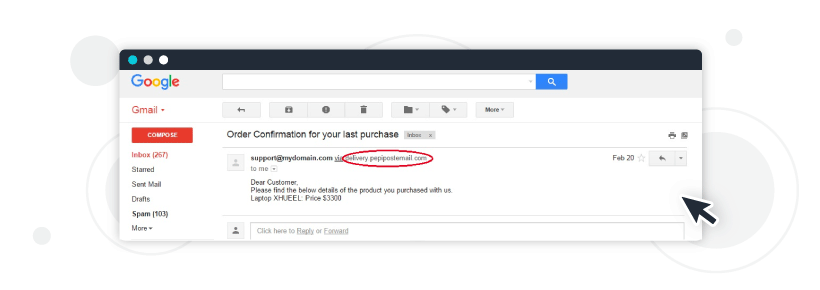
4. Self-managed billing and support
As mentioned earlier, one of the big advantages of white label marketing solutions is that you can mark up the service as you see fit. This generally means that you handle all billing and support, but it doesn’t always. There are some white label solution providers that insist on sending bills to your clients, and/or offering product support directly to your clients. When you see this, it usually means that instead of an actual white label provider they are more of an affiliate program.
While billing and providing support to your clients can be a burden, it’s one of the important aspects of providing a white labeled service. It not only ensures your clients aren’t seeing the man behind the curtain but also ensures the man behind the curtain isn’t going to try and steal your client.
5. Supports teamlancing
As agency marketers know, managing sophisticated campaigns requires a team that often includes external freelancers. To better manage the team and collaborate more effectively, you should find a white label solution that also supports teamlancing. What is teamlancing in an agency context? Teamlancing for agencies is when some or all of the team members on a given project are freelancers that collaborate in a closely networked manner towards the achievement of a common goal.
Specific platform functionality you should expect from your teamlancing enabled agency white label solution include:
- Central collaboration — the solution should allow for you, your internal and external team members, and your clients to all talk in one place, increasing the efficiency of messaging, getting progress updates and managing approvals.
- Consolidated client management — look for a solution that enables you to manage all your client campaigns, permission levels, user access controls, payments, and publishing in one central location.
- Streamlining features — no matter the reason for using the white label solution, whether it be creating content or launching campaign advertisements, ensure the solution supports a streamlined process whereby all members of the team have access to what they need, from integrated personas, pitching tools, brand guidelines, and approver workflows, to keep your teamlanced efficiencies up.
What are the best white label marketing tools?
Now that we’ve covered several best practices you should use when rolling out your own marketing white label solutions, you’re probably wondering about what kinds of white labeled marketing tools are out there.
White labeled solutions vary, including digital marketing tools, SEO tools, website design platforms and reporting engines. There are a number of vendors that have created high-quality services, for affordable rates, that you can easily white label as your own.
In another #MartechMonday post I introduced several of these white label-ready solutions that you and your marketing agency can use to improve your product offerings and make your company look better.
As a quick teaser, here are a few of the white label marketing tools I covered:
- White label marketing automation software. Did you know that good marketing automation software, such as Hubspot or Marketo, will cost a medium-sized business at least $15,000 annually? And that is if you skimp for their entry packages and don’t have a very large audience size you want to email. In the other post, I show you a white label, open-source, practically free marketing automation tool you can set up for your clients.
- White label conversion rate optimization software. Paying attention to the speed of a website, and optimizing forms and other website elements, is something businesses are generally concerned with. In the other post, I cover a white label ready tool that will help you offer conversion rate optimization without building it yourself.
- And I’ve covered five other white label solutions as well…

